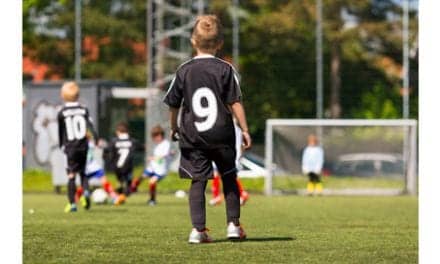
The 55- to 70-year old women and men participating in the present study had poor bone health, poor metabolic fitness, and poor aerobic fitness. The combination of football training and dietary advice produced good results on all parameters, researchers suggest. (Photo courtesy of Bo Kousgaard, Department of Sports Science and Clinical Biomechanics, Faculty of Health Sciences at the University of Southern Denmark)
Twice-weekly participation in football training sessions, combined with dietary guidance, helped improve the bone health among middle-aged and elderly men and women with prediabetes, researchers suggest.
The study, which examined the effects of football training on the health of untrained 55- to 70-year-olds with prediabetes was carried out in the Faroe Islands by football researchers and physiologists from the Department of Sports Science and Clinical Biomechanics at the University of Southern Denmark and the University of the Faroe Islands.
Results regarding the effects of such training on the participants’ bone health were published in the Scandinavian Journal of Medicine and Science in Sports.
In the study, 50 participants—25 males and 25 females—underwent a 16-week intervention comprising dietary guidance and twice-weekly football training sessions lasting 30 to 60 minutes. The duration of the training increased progressively from 30 minutes per session in the first 2 weeks to 60 minutes per session in the final 10 weeks.
The particular activity in which the participants took part was a modified version of football, called Football Fitness. It encompassed a thorough warm-up, ball drills in pairs, and games on small pitches.
The participants were 55- to 70-year-old untrained men and women who were prediabetic, had poor physical fitness, and were predominantly overweight. Around three-quarters had weak bones (osteoporosis or osteopenia in the legs), according to a media release from University of Southern Denmark Faculty of Health Sciences.
“Individuals with prediabetes and type 2 diabetes have a higher prevalence of osteopenia and bone fractures, so it is essential to develop treatment protocols for them. Our results show that football and dietary guidance are indeed an effective cocktail for improving bone health,” says Magni Mohr, project leader and associate professor at the University of Southern Denmark.
DXA scans were used to evaluate the initial bone health of the participants as well as the training-induced effects, along with blood samples to determine plasma markers for bone turnover and bone formation. From these measurements, 73% of the participants were diagnosed with femoral osteopenia and 24% with femoral osteoporosis prior to the intervention.
After 16 weeks of training, between-group changes in favour of football training were observed for bone mineral content of the femoral neck (3.2%) and femoral shaft (2.5%) as well as for bone mineral content (32 g). Plasma osteocalcin and P1NP were elevated in the football group by 23% and 52% respectively, with greater changes than in the control group, the release explains.
“The football group derived significant positive effects in the legs and clinically important femoral sites emphasizing that football is effective osteogenic training for this participant group,” Mohr states.
“Football is a multipurpose sport that combines strength, endurance, and high-intensity interval training, and this makes it a good tool for the prevention and treatment of type 2 diabetes and other lifestyle diseases,” notes Peter Krustrup, professor of sport and health sciences at the University of Southern Denmark, who has 15 years’ experience of studying the health-related effects of football, per the release.
The 55-70-year old women and men participating in the present study had poor bone health, poor metabolic fitness and poor aerobic fitness. The combination of football training and dietary advice produced good results on all parameters, Krustrup concludes.
[Source(s): University of Southern Denmark Faculty of Health Sciences, EurekAlert]





